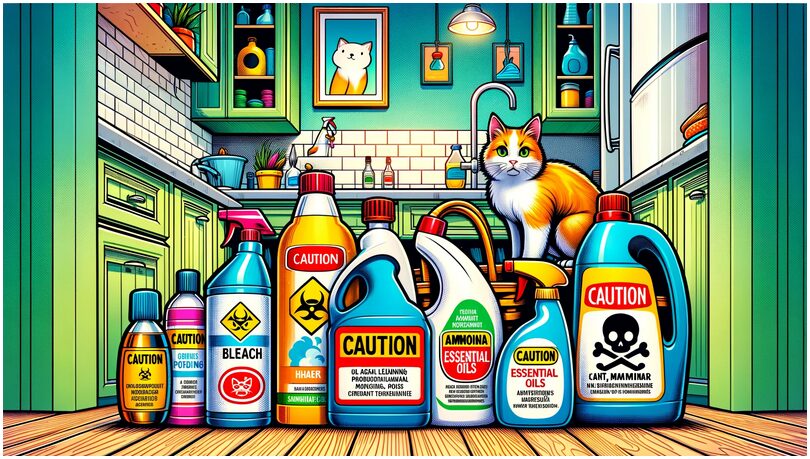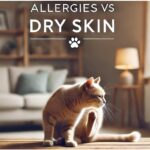As cat owners, we strive to create a safe and comfortable environment for our feline friends. However, many common household items and cleaning products that we use daily can pose significant health risks and are generally bad for cats. Understanding these dangers and taking proactive steps can help keep your pets safe and healthy. In this post, we’ll explore some of the most common household chemicals and cleaning products that can be hazardous to cats, along with safety tips for each.
1. Bleach and Ammonia
Bleach: A staple in many households for its disinfecting properties, bleach is highly toxic to cats. Ingesting bleach can cause severe gastrointestinal distress, including vomiting and diarrhea. Additionally, inhaling bleach fumes can lead to respiratory issues.
Ammonia: Found in many glass and surface cleaners, ammonia is another dangerous chemical for cats. Inhalation can cause respiratory problems, and ingestion can lead to severe gastrointestinal and neurological issues.
Safety Tips:
- Always store bleach and ammonia-based products in secure, cat-proof cabinets.
- Use these products in well-ventilated areas, and ensure your cat is not in the room during cleaning.
- Rinse surfaces thoroughly with water after using these cleaners to remove any residue.
2. Disinfectants and Antibacterial Cleaners
Many disinfectants and antibacterial cleaners contain chemicals such as phenols, quaternary ammonium compounds, and alcohols. These substances can cause skin irritation, respiratory problems, and even organ damage in cats.
Safety Tips:
- Opt for pet-safe disinfectants and cleaners that are free from harmful chemicals.
- Keep cats away from freshly cleaned surfaces until they are completely dry.
- Store all cleaning products securely out of reach.
3. Essential Oils That Are Bad For Cats
While essential oils are popular for their aromatic and purported therapeutic properties, many of them can be toxic to cats. Oils such as tea tree, eucalyptus, lavender, and citrus can cause a range of issues, from skin irritation to severe liver damage.
Safety Tips:
- Avoid using essential oils in diffusers or as cleaning agents in homes with cats.
- If you use essential oils, ensure they are stored securely and used in well-ventilated areas where cats do not have access.
4. Chemicals In Laundry Detergents and Fabric Softeners That Are Bad For Cats
Many laundry products contain chemicals like anionic and nonionic surfactants, optical brighteners, and enzymes that can be harmful to cats. Ingestion can lead to gastrointestinal distress, while skin contact can cause irritation and allergic reactions.
Safety Tips:
- Use pet-safe laundry detergents and fabric softeners.
- Ensure all laundry items are thoroughly rinsed and dried before allowing your cat to come into contact with them.
- Store laundry products securely out of reach.
5. Toilet Bowl Cleaners
Toilet bowl cleaners often contain harsh chemicals such as hydrochloric acid and bleach. If a cat drinks from a toilet that has been recently cleaned, it can suffer from severe chemical burns and poisoning.
Safety Tips:
- Keep toilet lids closed at all times to prevent cats from drinking the water.
- Use pet-safe toilet cleaning products.
6. Rodenticides and Insecticides Are Very Bad For Cats
Rodenticides (rat and mouse poisons) and insecticides can be deadly to cats if ingested. These products often contain potent chemicals designed to kill pests but can also cause severe illness or death in cats.
Safety Tips:
- Avoid using rodenticides and insecticides in areas accessible to your cats.
- Opt for pet-safe pest control solutions.
- Store all pesticides securely out of reach.
7. Air Fresheners and Scented Candles Can Be Bad For Cats
Air fresheners, plug-ins, and scented candles can emit volatile organic compounds (VOCs) that are harmful to cats. Prolonged exposure can lead to respiratory problems, allergies, and other health issues.
Safety Tips:
- Choose unscented or pet-safe air fresheners and candles.
- Ensure proper ventilation when using these products.
- Avoid using them in areas where your cat spends a lot of time.
Conclusion
Creating a safe home environment for your cat involves being mindful of the products you use daily. By identifying and eliminating potential hazards, you can protect your feline friend from the dangers posed by common household chemicals and cleaning products. Always opt for pet-safe alternatives and store all hazardous substances securely out of reach. Your cat’s health and safety are worth the extra effort.
For more information and tips on keeping your home safe for your pets, be sure to explore our related posts below on Home With Cats.
References
- ASPCA. Poison Control
- Cornell Feline Health Center. Common Cat Hazards







Hi there very nice web site!! thank you for sharing. . . . . .
Fantastic blog! Do you have any hints for aspiring writers? I’m hoping to start my own site soon but I’m a little lost on everything. Any recommendations? Many thanks!
Wonderful site. Lots of helpful information here. I抦 sending it to some friends. And naturally, thank you in your effort!